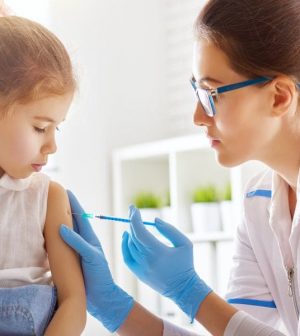- Could Your Grocery Store Meat Be Causing Recurring UTIs?
- Are You Making This Expensive Thermostat Error This Winter?
- Recognizing the Signs of Hypothyroidism
- 10 Strategies to Overcome Insomnia
- Could Artificial Sweeteners Be Aging the Brain Faster?
- Techniques for Soothing Your Nervous System
- Does the Water in Your House Smell Funny? Here’s Why
- Can a Daily Dose of Apple Cider Vinegar Actually Aid Weight Loss?
- 6 Health Beverages That Can Actually Spike Your Blood Sugar
- Treatment Options for Social Anxiety Disorder
For School Kids, Vaccines Are Key

Be sure to put vaccinations on your children’s back-to-school lists, whether they’re just starting school or heading off to college, experts say.
By protecting infants, children and teens from serious diseases, vaccinations also protect families, schools and communities.
“The best way to treat diseases is to prevent them in the first place, and the diseases on the vaccine schedule are all preventable for the vast majority of our population,” said David Kimberlin, vice chair of pediatrics at the University of Alabama at Birmingham (UAB).
“The scientific evidence and public health statistics are comprehensive and compelling — properly scheduled and dosed vaccines are safe and effective, and they’re the reason we don’t see diseases like measles or whooping cough running rampant across our country,” Kimberlin said in a university news release.
Kimberlin is the American Academy of Pediatrics’ liaison to the U.S. Centers for Disease Control and Prevention’s advisory committee on immunization practices.
Immunization requirements vary by state. All have a minimum requirement for dosing each school year to attend public schools. Many require an updated immunization certificate before a child enters any public school or child care center.
Here’s what else you should know:
- All 50 states and the District of Columbia require vaccinations for diphtheria, tetanus and pertussis, polio, measles and rubella.
- 49 states and D.C. also require mumps vaccination.
- 48 states and D.C. require varicella (chickenpox) vaccination. (Montana and Pennsylvania do not).
- 45 states and D.C. require hepatitis B vaccination to enter kindergarten. (Alabama, Maine, Montana, North Dakota and South Dakota do not).
- Some states require Hib (Haemophilus Influenzae Type b); PCV (pneumococcal); flu and hepatitits A vaccines to enter kindergarten.
Insurance covers school vaccinations. If you don’t have insurance, your state health department can direct you to services that offer low-cost and/or free immunizations, said Dr. Rachael Lee, an assistant professor in the university’s division of infectious diseases.
Vaccinations are available at doctor offices, pharmacies, health centers and local health departments.
College students require specific vaccinations and should check with their school to learn which ones they need, the UAB experts said.
Life-threatening infections such as meningococcal disease are more common among college-age people, but can be prevented through full vaccination, the experts said.
More information
The U.S. Centers for Disease Control and Prevention has more on vaccines for children.
Source: HealthDay
Copyright © 2026 HealthDay. All rights reserved.










